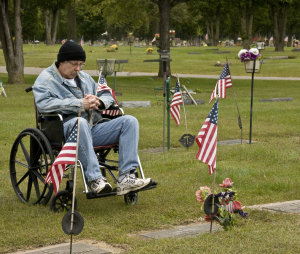Memorial Day in the US is a time to remember those who died while serving in the military. It also serves a very important function, in reminding us that our troops are not just "boots on the ground" or "armed forces" or "a military presence." They are real people who put their lives on the line, in protection of their homeland and defense of innocents. They are individuals with hopes and dreams. Some are friends, lovers, husbands and wives, sons and daughters, parents - the center of other lives, the beat of someone else's heart.

Their deaths diminish all of us. In my family, my oldest uncle was lost in WWII, in the fields of France. He was the oldest son, my father's brother. He was the one who was destined to set the world on fire. The smartest of the three (and my father was a PhD geneticist, so that's saying something.) He was the one who understood people, the one with the most friends, the law student who was going to be Canadian Prime Minister one day. Instead, he's become a part of the soil of a foreign land.
My father spoke of him almost every day, until his own death at age 88. It was, for him, an incalculable loss. For me, another uncle I never got to meet.
There are times when war seems inevitable, when madness and blindness and greed set events in motion that seem only stoppable with the blood of patriots. Sometimes events in another land cry out for humanitarian intervention, and our military members stand up to be counted. We owe those soldiers much.
But what we most owe them, and every person who puts on a uniform going forward, is attention. Accountability. Open eyes, not blind and lazy acceptance of what we are told.
From Vietnam to Iraq, we have been shown that our leaders turn to war for complex and suspect reasons. Some of those are not essential national safety, not worthy of the trust given them by our men and women in uniform. Sometimes it's greed, ego, power, undue influence. Sometimes a real crisis is given spin and propaganda, and used for evil ends.
We are losing our veterans to suicide, at a rate of 22 a day, twice as high as civilians. These too, are casualties of how we wage war.
We owe our military, the dead and the living, our attention. We owe it to them to ask our leaders to justify uses of force with more than empty rhetoric. We must demand accountability. Both for the use they make of our military, and for the support they sometimes don't give to our veterans.
Our soldiers, sailors and airmen and women stand up to place their mortal bodies between us and harm. We owe it to them to be sure we don't use that sacrifice to line pockets, push corrupt ideologies, support unworthy regimes, or help our businesses make more money. It is up to all of us to do our best - checking data, writing letters, discussing, supporting investigations, and voting - to be sure that their courage is not rewarded by betrayal at the top.
To all those who served and paid the ultimate price, I thank you. Whether unavoidable war, questionable war, corrupt war - you still gave your trust to our leaders to protect the innocent lives at home. It's now up to us to elect and monitor leaders who will not abuse that most precious gift. My uncle died reclaiming Europe from the Nazis. There was little doubt in his family's minds that their loss was for a good and true cause. In a better world, every bereaved family should able to feel the same way.
 newest »
newest »
 newest »
newest »
 Yeah - interestingly even veterans who did not see active combat have a somewhat higher suicide rate than civilians who never served... we need to figure out all the causes and triggers. Comfort with using a gun and gun ownership rates might play into that, or the authoritarian structure of the military. And experiences in combat, both losses, trauma, and the role we force our soldiers into against a civilian population, come into it for our combat veterans. Drug and alcohol use... The lack of good, available, long-term support is also an issue. There are lots of stories of how hard it is to get psych care when it's needed.
Yeah - interestingly even veterans who did not see active combat have a somewhat higher suicide rate than civilians who never served... we need to figure out all the causes and triggers. Comfort with using a gun and gun ownership rates might play into that, or the authoritarian structure of the military. And experiences in combat, both losses, trauma, and the role we force our soldiers into against a civilian population, come into it for our combat veterans. Drug and alcohol use... The lack of good, available, long-term support is also an issue. There are lots of stories of how hard it is to get psych care when it's needed.




The data about veterans to suicide is very upsetting. I had no idea.